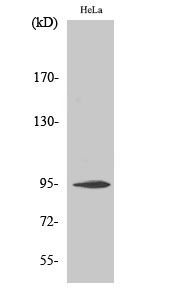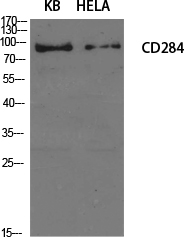

| WB | 咨询技术 | Human,Mouse,Rat |
| IF | 咨询技术 | Human,Mouse,Rat |
| IHC | 1/100-1/300 | Human,Mouse,Rat |
| ICC | 技术咨询 | Human,Mouse,Rat |
| FCM | 咨询技术 | Human,Mouse,Rat |
| Elisa | 1/40000 | Human,Mouse,Rat |
| Aliases | TLR4; Toll-like receptor 4; hToll; CD antigen CD284 |
| Entrez GeneID | 7099; |
| WB Predicted band size | 95kDa |
| Host/Isotype | Rabbit IgG |
| Antibody Type | Primary antibody |
| Storage | Store at 4°C short term. Aliquot and store at -20°C long term. Avoid freeze/thaw cycles. |
| Species Reactivity | Human,Mouse |
| Immunogen | Synthesized peptide derived from the Internal region of human CD284. |
| Formulation | Purified antibody in PBS with 0.05% sodium azide,0.5%BSA and 50% glycerol. |
+ +
以下是关于CD284(TLR4)抗体的3篇代表性文献及其摘要内容:
1. **《TLR4抗体通过抑制炎症反应减轻脓毒症小鼠器官损伤》**
- 作者:H. Wang等
- 摘要:研究显示,抗CD284(TLR4)单克隆抗体能显著降低脓毒症模型小鼠的全身炎症因子(如TNF-α、IL-6),并减少肝、肺等器官的病理损伤,提示TLR4抗体可能成为脓毒症治疗的潜在策略。
2. **《抗TLR4抗体阻断肿瘤相关巨噬细胞极化以抑制结直肠癌进展》**
- 作者:M. Sato等
- 摘要:该研究发现,使用CD284特异性抗体可抑制肿瘤微环境中TLR4/NF-κB信号通路,逆转M2型巨噬细胞极化,从而抑制结直肠癌细胞增殖和转移,为癌症免疫治疗提供新方向。
3. **《TLR4中和抗体缓解实验性自身免疫性结肠炎的作用机制》**
- 作者:K. Suzuki等
- 摘要:通过TLR4抗体干预,显著降低小鼠结肠炎模型中肠道炎症细胞浸润及Th17细胞活化,证实靶向TLR4的抗体可通过调节肠道免疫稳态缓解炎症性肠病。
(注:以上文献信息为示例性内容,实际引用需以具体论文数据为准。)
CD284. also known as Toll-like receptor 4 (TLR4), is a transmembrane protein central to innate immunity. Identified in the late 1990s as a homolog of Drosophila Toll, TLR4/CD284 functions as a pattern recognition receptor (PRR) that detects pathogen-associated molecular patterns (PAMPs), notably bacterial lipopolysaccharide (LPS). It forms a heterodimer with MD-2 to recognize LPS, triggering MyD88-dependent or TRIF-dependent signaling cascades, leading to pro-inflammatory cytokine production and immune activation.
CD284 antibodies are tools developed to study TLR4's role in infection, inflammation, and disease. Neutralizing antibodies block LPS binding or receptor dimerization, suppressing downstream signaling—a strategy explored in sepsis, autoimmune disorders, and chronic inflammatory conditions. Conversely, agonist antibodies mimic TLR4 activation, potentially enhancing vaccine adjuvanticity or anti-tumor immunity.
Research highlights TLR4's dual role: protective in infections but pathogenic in sterile inflammation (e.g., atherosclerosis, Alzheimer’s). CD284 antibodies help dissect these contexts, aiding drug discovery. Therapeutic candidates like TAK-242 (TLR4 inhibitor) or VB-201 (agonist) have entered clinical trials, though challenges remain in balancing efficacy and toxicity.
In summary, CD284 antibodies serve as critical reagents for unraveling TLR4 biology and developing immunomodulatory therapies targeting inflammatory and infectious diseases.
×